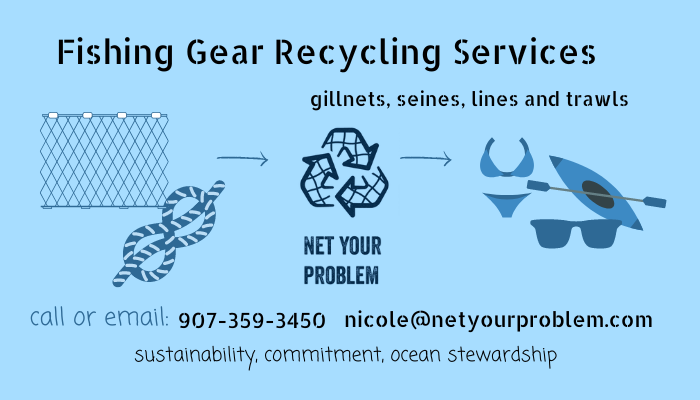The Fish Ticket
October 13, 2024
Permits & State Fisheries
Permit and state fishery activity was slower this week. NMFS has released a new Biological Opinion (BiOp) and Environmental Impact Statement (EIS) for the Southeast salmon troll fishery. If you'll recall, an appellate court allowed the fishery to stay open last year after a lower court tried to shut it down over concerns about its effects on Washington's Southern Resident Orcas. According to ADFG's initial review, the Southeast fishery should be able to continue uninterrupted with the publishing of these court ordered documents.
The Kenai City Council voted to support the addition of set beach seines as a legal gear type for the Cook Inlet East Side setnet fishery before the 2025 season. This is one of 15 Agenda Change Requests that will be heard at the October 29-30 Board of Fish Work Session. The comment deadline for the work session is October 15. View ACRs and submit comments here.
Here's the Board of Fisheries proposal book for the 2024/2025 meeting cycle.
IFQs & Federal Fisheries
Halibut fishermen are continuing to see fairly steady ex-vessel prices. In Seward, OBI stopped buying, which makes Resurrection Bay the only buyer left in town. Still, a delivery on Saturday fetched $5.50 straight. In Homer, boats last week got $5.90-$6.00 straight. Homer's ice plant will shut down in a couple weeks, which has historically had a notable negative impact on price. Meanwhile, reports of poor halibut fishing in the Gulf continue to roll in. Here are some notes from the grounds this week. If you haven't, please reply to this email and let us know what you're seeing!
"Some of the worst fishing I've ever seen." - Anonymous (GOA halibut longliner)
"There are fish to be found, but they're not where they used to be. I can't go to all my old spots anymore." - Anonymous (Southeast halibut longliner)
The statewide halibut TAC is 73% harvested, with 2C at 82%, 3A at 80%, 3B at 79%, 4A at 49%, 4B at 30%, and 4C/D at 36%. The statewide sablefish TAC is 52% landed, with AI at 4%, BS at 28%, CG at 67%, SE at 69%, WG at 61% and WY at 79%. [more]
Here's a full recap of the North Pacific Fisheries Management Council October meeting. Of note:
- - Bering Sea snow crab will open for the first time since 2021/22, and the Bering Sea Tanner and Bristol Bay red king crab fisheries both saw increased TACs. All three seasons open October 15. (The snow crab season was a surprise to many, including Trident Seafoods, which told NPFMC on Monday that it won't process crab in St. Paul because the TAC is too small for it to be profitable.)
- - The Council recommended changes to the fishing trip cancellation policy in ODDS to mitigate trip cancellation issues. A trip selected for observer coverage may no longer be cancelled, it may only be edited.
- - The Council recommended no further action on an effort to implement crew data collection. More on that here.
- - The Council reviewed the definition of "pelagic" trawl gear, adding an alternative that would "update the regulatory definition of pelagic trawls in Alaska to clearly allow for additional flotation in codends and bycatch excluder devices, remove unnecessary outdated text, and allow instrumentation necessary to monitor and adjust net performance."
What Else?
1.8 BILLION dollars. Billion, with a B. That's the amount of revenue estimated by NOAA to have been lost by Alaska's seafood industry in 2022-2023. NOAA's Alaska Seafood Snapshot report notes a 50% decline in profitability from 2021 to 2023, the ripple effects of which have led to over 38,000 lost jobs nation wide, a $4.3 billion drop in total US output, and a combined loss of $269 million in state and local tax revenues.
ICYMI: here's a recap of the US House Fisheries Debate held in Kodiak last week. Click here to watch the whole debate (if you're an Alaskan voter, it's worth your time, I promise!).
The effects of last month's GOA pollock trawl closure, triggered by the accidental harvest of 2,000 king salmon, have been swift and painful for both fishery participants and the town of Kodiak. According to one fisheries economist, this looks like $9 million in lost ex-vessel revenue, about $500,000 in state and local tax revenue, $50-60 million in lost wholesale revenue for processors, and at minimum 100 lost processing jobs. That's before accounting for the ripple effects that will undoubtedly hit service and support sectors. Meanwhile, genetic samples from the 2,000 salmon have been shipped off for processing, but results aren't expected for another six months.
In more encouraging bycatch news, Bering Sea bottom trawlers have been experimenting with "web fences" to deter orcas from entering their nets, and the results look promising; fishery officials have logged just one orca take so far this year. While one orca is still too many, it's far less than the nine orcas hauled up by bottom trawlers last year. Progress.
NOAA introduced the implementation plan for their National Seafood Strategy, which "outlines actions we can take to enhance industry resilience and competitiveness in the face of climate change and other stressors."
A US Appellate Court stripped regional fishery management councils of their "pocket veto" power, following a lawsuit brought by two commercial fishermen against the Mid-Atlantic Fishery Management Council over sector allocation issues.
A Washington State federal court ruled that the U.S. Army Corps of Engineers’ permit authorizing finfish farming in federal waters is unlawful because the Corps failed to thoroughly examine the adverse environmental effects of finfish farming.
Over vehement industry objections, the former Peter Pan Seafoods owner Roger May got the judge's stamp of approval on his bid for Peter Pan's remaining assets, which is scheduled to close October 15. Fear not, though, this saga isn't over yet: attorney's for one of Peter Pan's top creditors filed an appeal of the approval, which the receiver overseeing the asset sale has asked the court to ignore. And so it continues...
Trident Seafoods' iconic vessel, F/V Bountiful, is now owned by Shelford Fisheries, a Washington based family company which plans to process red king crab on board out of St. Paul during this year's Bristol Bay season.
Opponents of Western Alaska's proposed Donlin Gold mine are heralding the recent finding that the Army Corps of Engineers failed to adequately account for the risks of a catastrophic release of tailings when issuing a key permit. Donlin owners have a few weeks to come up with a proposed fix.
In other mining news, two months after dozens of fish were found dead just downstream from a Southeast Alaska gold mine, state regulators still don't know what happened. Water contamination is suspected, but the state is still waiting on data from the mine's operator.
Just outside of Unalaska, a Panama-flagged 738' cargo ship carrying over 300,000 gallons of fuel is struggling to hold anchor amidst winds strong enough to run the vessel aground. The Coast Guard evacuated four of the 21 crew so far, a tug is standing by, and officials are weighing environmental and safety impacts.
Thursday's Alaska Fisheries Report: ADFG announces snow crab season but Trident Seafoods won't be processing for St. Paul; and the future of herring in Japan.
September 27 Bering Sea Barometer: Pot cod fishing wraps up, salmon bycatch in the Gulf shuts down pollock trawling.






